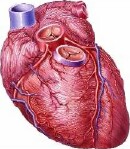Don't Miss
- Calories, Not Meal Timing, Key to Weight Loss: Study
- Dietary Changes May Beat Meds in Treating IBS
- Screen Pregnant Women for Syphilis, Ob-Gyn Group Advises
- Even With Weight Gain, Quitting Smoking in Pregnancy Still Best for Health
- A-Fib Is Strong Precursor to Heart Failure
- One Neurological Factor Keeps Black, Hispanic Patients From Alzheimer’s Clinical Trials
- Managing Blood Sugar After Stroke Could Be Key to Outcomes
- Dozens of COVID Virus Mutations Arose in Man With Longest Known Case
- Blood Test Might Someday Diagnose Early MS
- Check Your Fridge for Trader Joe’s Fresh Basil, Linked to Salmonella
Taking Care of Your Heart
By LadyLively on February 15, 2014


Heart disease is the biggest killer of American women and men. But, it’s also a preventable disease in many cases.
With February designated American Heart Month, Dr. Suzanne Steinbaum, director of Women’s Heart Health at Lenox Hill Hospital in New York City, offers 10 tips for reducing your risk of cardiovascular trouble:
- Know your numbers: Tests will give you insight into your risk for heart disease. Keep track of your blood pressure, cholesterol levels, hemoglobin A1C (blood sugars) and inflammatory markers.
- Watch your diet: “Research has shown a diet high in fruits and vegetables, whole grains, legumes, nuts and olive oil — consistent with the Mediterranean diet — can decrease the incidence of heart disease by 30 percent, whereas diets high in saturated fats and simple sugars can increase the risk of heart disease by 30 percent,” Steinbaum said. “Paying attention to what you are eating is one of the major cornerstones of keeping your heart healthy.”
- Exercise: American Heart Association guidelines recommend two and a half hours of cardiovascular exercise per week, Steinbaum said. Exercise lowers the risk of heart disease, stroke, diabetes, obesity and other medical conditions.
- Manage your stress: “Stress takes a toll on the heart, increasing hormones throughout the body [that are] associated with the ‘flight-or-fight syndrome,’ leading to an increase in heart rate and blood pressure,” Steinbaum said. “It can also increase the stress hormones, such as cortisol, which causes inflammation, all leading to heart disease. We all have stress in our lives, and managing it is a large part of being heart-healthy.”
- Master the art of well-being: Positive emotions such as optimism can lower your risk of heart disease, and laughter is helpful too, Steinbaum said. It boosts the immune system, decreases stress and lowers blood pressure.
- Keep your arteries healthy: “Foods like dark chocolate, berries, tea and red wine … help to dilate the arteries, decrease blood pressure, lower cholesterol and prevent clotting,” Steinbaum said. “If there is stiffness to the lining of the arteries, called the endothelium, then you are at risk to develop heart disease. An EndoPAT test, which is a noninvasive test assessing the function of the endothelium, can alert you if you are a candidate for building up plaque in the arteries of the heart, which can lead to heart attack.”
- Be aware of gender differences in heart disease: If you’re concerned that you have symptoms of heart disease, seek help and call 911. Some women are hesitant about getting assistance because they worry they may be wrong. “Always be safe rather than sorry,” Steinbaum said. For women, signs of heart disease can be subtle: shortness of breath, jaw pain, back pain, nausea, vomiting, sleep disturbances or fatigue.
- Talk to your family: Get information about your family’s medical history. “Although heart disease is due to lifestyle choices 80 percent to 90 percent of the time, a significant family history is critical to know,” Steinbaum said. “If you had a mother with heart disease [when she was younger than] 65 years old, or a father with heart disease [at younger than] 55 years old, early diagnosis and prevention is key. The earlier you know, the more chance you have to change your outcome and be in control of your potential destiny.”
- If you’re a woman, consider your pregnancy history: If you had high blood pressure or elevated sugars during pregnancy, you are at higher risk of heart disease.
- Be proactive about screening tests: “If you have multiple risk factors for heart disease or a strong family history, get screened … to determine your real risk of heart disease,” Steinbaum said. “If [your test results] are abnormal, then your risk goes up and aggressive prevention should start immediately, whether it is lifestyle changes or medication. Having the information empowers you to make a difference in the rest of your life’s heart health. It is worth getting the information.”
More information
The U.S. National Library of Medicine has more on heart disease.
Source: HealthDay
Copyright © 2024 HealthDay. All rights reserved.










